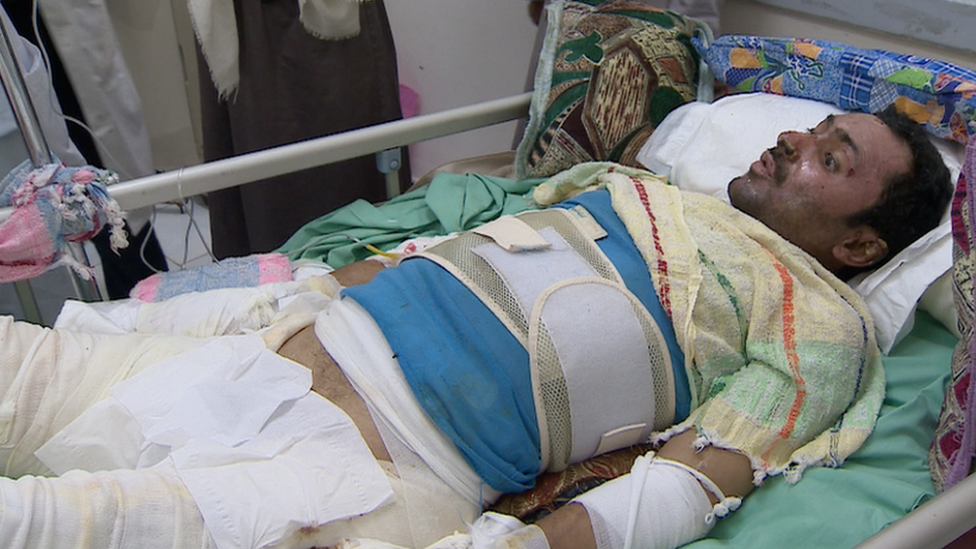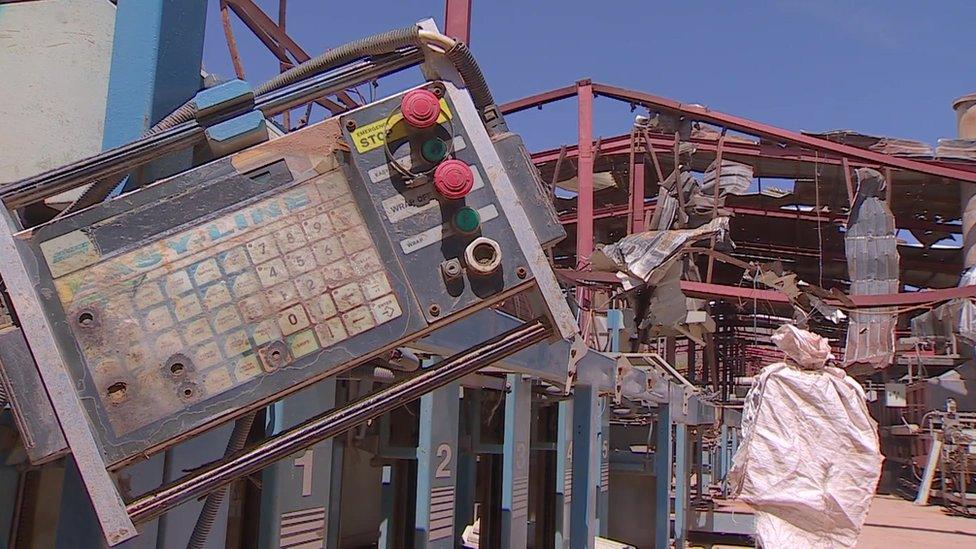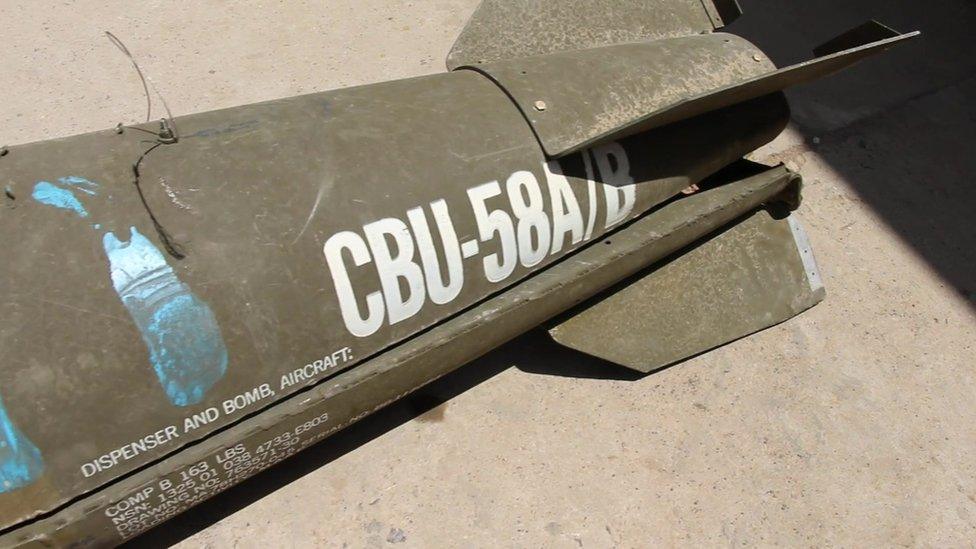A year of war that has set Yemen back decades
- Published
Orla Guerin is shown shrapnel found in the wreckage of a factory in Yemen destroyed in a Saudi-led coalition air strike
Ahmed Sharif stood on top of a mound of rubble, waving a dinner plate. "The Saudis attacked this," he said. "There was no weapons facility. There was no military site. This was a tourist attraction."
He descended from the wreckage of a house that had stood for 1,400 years to gave me a tour of Kawkaban - an ancient citadel perched on a cliff top. Locals say this Yemeni treasure was hit by Saudi airstrikes in February, killing seven civilians. Mr. Sharif's brother-in-law was one of them. He pointed to fragments of clothing in among the rubble. "That's what's left of him," he said.
The dead of Kawkaban are among at least 3,200 civilians killed here in the past year. The United Nations says most were victims of airstrikes by the Saudi-led coalition. A UN panel has accused the Saudis and their allies of bombing schools, health facilities, wedding parties and camps for the displaced.
'The pain is so intense'
Saudi Arabia says it makes every effort to avoid hitting civilian targets, but that's little consolation to the burn victim we met in hospital in Sanaa.
Abdel Bari Omar survived an airstrike outside the city last month, but only just. The van driver lay in bed, bandaged from the chest down. He was transporting gas cylinders when the fighter jets struck.
"The pain is so intense only God can understand," he said, through trembling lips. "Whatever way I turn I am in agony. I'm afraid this pain will stop my heart." His other fear is about the future of his children now their breadwinner has burns on more than 40% of his body.

Abdel Bari Omar was transporting gas cylinders when fighter jets struck
Saudi Arabia's bombing campaign was supposed to reinstate Yemen's ousted President, Abed Rabbu Mansour Hadi, and contain the Shia Houthi rebels who drove him out.
Riyadh claims they are puppets of its regional rival, Iran. A year on, the president remains out of sight, and the Houthis remain in control of the capital.
"We can keep fighting forever," said Mohamed Ali Al Houthi, the rebel leader who occupies the Presidency building, and has a traditional dagger in his waistband. "If they continue the war we are ready for that, and if they want peace we want it even more."
The Houthis too are accused of killing innocent civilians by indiscriminate shelling - something they deny. But the troubling questions here aren't only for the warring parties.
The British connection
Yemeni businessman Ghalib al-Sawary wants to know why Britain has played a role in ruining his life's work.
He walked me through the wreckage of Radfan Ceramics, a factory outside Sanaa that employed 350 people before the war. Airstrikes last year - which reportedly killed one man - reduced the factory to a shell.
"We built it over 20 years," he said, "but to destroy it took only 20 minutes."
Waleed Noman of Unicef, shows Orla Guerin around a school in Yemen's capital, Sanaa, that was deserted after a Saudi-led coalition air strike across the road.
Mr Sawary showed me hunks of mangled metal bearing the label of a British manufacturer - GEC Marconi Dynamics - which he says were recovered after the airstrike. He keeps plenty of them, under lock and key. The campaign group Human Rights Watch (HRW) has identified the remnants are part of a British made cruise missile.

The ceramics factory in Matnah was allegedly destroyed by a British-made bomb
For Mr Sawary the pain of loss was heightened by the origin of the weapon. "I studied in Britain in 1988. We respect the British people and we like them," he said, "but we are blaming them for supplying this weapon."
Campaigners say the attack on the factory - which appeared to be producing only civilian goods - was an apparent violation of the laws of war. They believe it may also have violated the UK's rules on arms exports.
A British government spokesman denied there had been any breach and said the UK had robust controls for arms exports.
At a police station in Sanaa, Yemeni security officials put a US made cluster bomb unit on display. They claim it was dropped in the Western suburbs in January scattering deadly bomb-lets over a civilian area. They produced several from a pink plastic shopping bag. The coalition has denied using the weapons, which have been banned by more than 100 countries.

The Saudi-led coalition has denied allegations that it is using cluster bombs in Yemen
Much of the death and destruction here in the past 12 months has gone unseen - one more war in a troubled region.
"Yemen was already forgotten, prior to the escalation of the conflict," said Johannes van der Klaauw, of the UN's refugee agency, the UNHCR. He believes the crisis has not had the attention it deserves in part because Yemenis aren't reaching Europe's shores.
"I am afraid there is a link," he said. "I see that the international community and particularly Europe has now galvanised more support and also political action because the Syrians and the Iraqis are coming in large numbers to Europe. If the Yemenis would do the same I am sure there would be more attention for Yemen."
For most Yemenis there is no hope of escape, but more peace talks are planned for next month, to be accompanied by a ceasefire.
Whatever the outcome, UN officials fear that one year of war has set the Arab world's poorest country back decades.